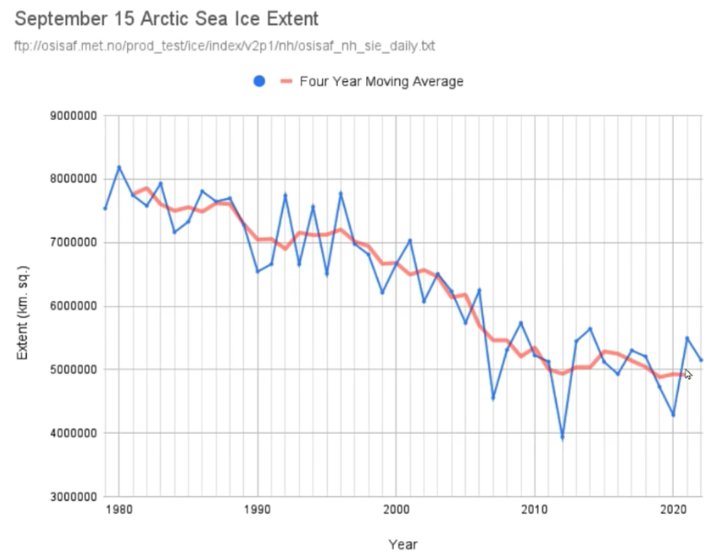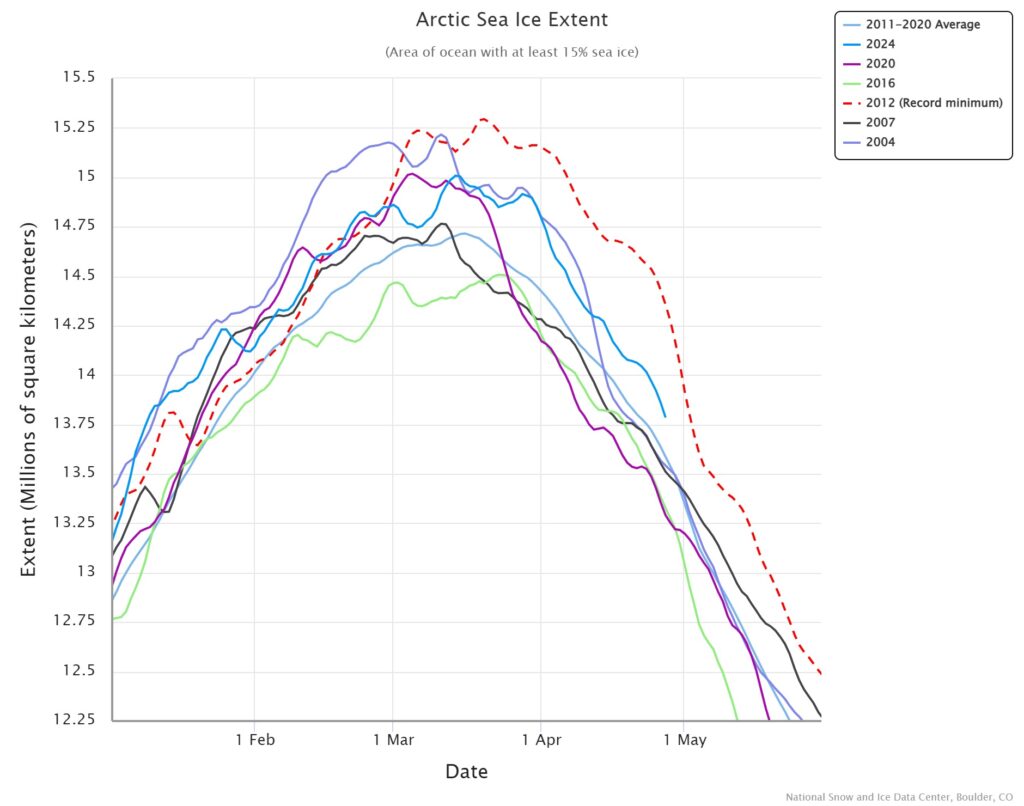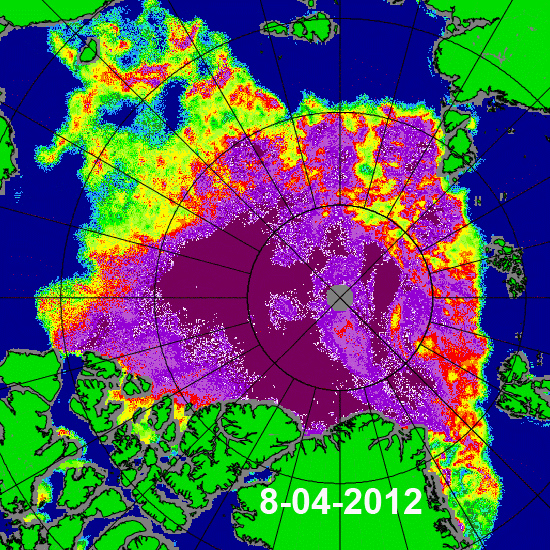Our regular reader(s) may be wondering at this juncture, but that is not a typo in today’s title. For an in depth discussion of how alleged “renowned amateur naturalist and honorary doctor” Chris Packham sensationally rebranded Toby Young’s self identified “skeptical” web site live on air on the BBC’s “Sunday with Laura Kuenssberg” see here.
By way of additional background information see also our in depth investigation of the Daily Sceptic’s Arctic porky pie production line over here.
To the apparent astonishment of the Septic’s alleged “Environment Editor”, Chris Morrison, Reuters Fact Check has now followed in “Snow White’s” dainty footsteps through the as yet unmelted Arctic snow cover:
A headline touting a small increase in Arctic sea ice on a single date after a decades-long decline is being shared online to suggest that climate-change warnings are a hoax.
But the data show that average sea ice cover in the Arctic is still dropping over the long term and scientists say that minor variations on individual days don’t negate that overall downward trend or the contribution of global warming…Experts say while the quoted figures 20 years apart are accurate, “cherry-picking” individual dates does not provide a meaningful picture of what is happening in the Arctic.
It is more accurate to look at the data over the long term, which shows that the extent of Arctic ice has been declining since satellites began continuously recording in 1979.
“Even if sea ice was partially recovering in the Arctic, which it is not, you cannot deny the other markers of climate change on Earth that are not related to sea ice per se, but are still true,” Gaëlle Veyssière, a sea ice physicist from the British Antarctic Survey, said in a phone interview. “You can’t deny climate change based on a single marker that fits your narrative.”
Citing data from the University of Colorado’s National Snow and Ice Data Center, The Daily Sceptic said there were 13.68 million square kilometres of Arctic ice on Jan. 8, 2024.
That is slightly higher than the 13.64 million sq km recorded on Jan. 8, 2004, which in turn was down from 14.05 million sq km a year earlier.
But ice levels during large parts of February and March 2024 were lower than during the same periods in 2004, Walt Meier, a senior research scientist at NSIDC, told Reuters.
“Comparing two specific days from two specific years is not an indicator for or against long-term changes,” Meier said in an email.
“The sea ice varies from day to day and from year to year.”
Arctic ice levels usually peak in March and reach their lowest levels in September. But weather can be a major driver in causing day-to-day or even annual fluctuations, experts said.
“For example, in 2012, where we saw the record minimum in September, the sea ice extent in March was quite high,” said Veyssière, who is also a research fellow at University College London.“
Then it started melting in spring. But in August there was a cyclone, which moved the ice around, which increased the melting and resulted in the minimum we saw in September.”
In Chris Morrison’s “rebuttal” of the Reuters fact check on the Daily Sceptic site today he states, amongst many other things, that:
The article featured the work of Danish scientist Allan Astrup Jensen who observed that the summer Arctic ice plateaued from 1979-97, fell for 10 years and then resumed a minimal downward trend from 2007. We also noted the work of climate journalist Tony Heller who used a four-year moving average, shown below, that revealed that the Arctic sea ice extent at its minimum level in September has been stable for over a decade.

I recommend that interested parties click the link just above should they wish to take a close look at some examples of Mr. Heller’s purple prose in his role as the proprietor of an Arctic porky pie production line.
Please also read the entire Reuters takedown of the Daily Sceptic’s unscientific Arctic skepticism, but in the meantime here is the very latest update of the NSIDC Arctic sea ice extent metric:

To peruse a wide variety of other Arctic sea ice metrics unavailable via the Daily Sceptic, including Arctic snow cover, please see the latest edition of the Great White Con Arctic sea ice news.
[Update – April 29th]Here is another extract from Mr. Morrison’s alleged “rebuttal”, this time concerning an earlier “fact check” by the BBC:
This latest fact check was similar to the failed attempt made recently by the BBC statistical programme More or Less. In both cases, exception was taken to our reporting that on January 8th this year, Arctic sea ice extent had soared to its highest level for 21 years. This was factually correct as both the BBC and Reuters confirm. Since the article went viral on social media, the attack focused on a claim of “cherry picking”, despite the article clearly placing the statistic in the context of long-term changes in Arctic sea ice. In the third paragraph it was noted: “We must be careful not to follow alarmists down their chosen political path of cherry picking and warning of climate collapse on the basis of individual events.”
The “abstract” of the More or Less radio programme on the BBC World Service states:
The area of ice covering the Arctic ocean has been in a state of long decline, as climate change takes effect. But recent fluctuations in the ice have been seized on by climate change sceptics, who say it tells a different story.
It consists of an interview with Professor Julienne Stroeve from University College London. Presenter Tom Colls points out that:
If you cherry pick a few days in early 2024, from the 7th to the 11th of January, the Arctic sea ice was at it’s highest level since 2004, but if you pick any other dates in January that’s not true.
And if you cherry pick the 1st, 2nd, 3rd and 4th of January there was less Arctic ice compared to the same dates in 2012, the year when the Arctic went the closest that it has so far to being ice free in the summer.
But I would not recommend any of those comparisons, because, well Arctic ice is complicated. So let’s back up a little, leave the Daily Sceptic behind, and start with the basics.
Hear, hear Tom!
Skipping over the “basics” that will be familiar to our regular readers, but apparently not to Chris Morrison, we hear Julienne pointing out that:
There has been this transition from more first year ice than multi-year ice. First year ice only grows about 1.5 to 2 meters thick every winter.
Tom adds a more “advanced” point :
However, thinner ice grows faster than thicker ice, and brand new ice grows fastest of all, so there might be a lot less ice by volume because of the depth, but you wouldn’t necessarily see the same decrease in area.
And after years where a lot of ice melts in the summer there’s often a big “rebound” as the open ocean quickly refreezes in the winter. It would be useful here to have accurate long term data on the thickness of the ice, but that’s not available yet.
There’s then a discussion about the effects of short term “weather” on sea ice, including the sudden reduction in sea ice area during the “Great Arctic Cyclone” that occurred in August 2012. You can read a blow by blow account of that astonishing event on Neven Acropolis’s Arctic Sea Ice Blog:
Julienne then points out that:
There is no correlation between the winter sea ice extent and how much will melt out in the summer, and we have seen this time and time again.
At which juncture I will just leave this here:
At the risk of repeating myself:
— Snow White (@GreatWhiteCon) February 9, 2024
“You keep repeating the same irrelevance over and over again”
See this “opinion” from a commenter on the GWC blog:https://t.co/JNdqBgoLtk
Then explain to me in what way your sacred metric is relevant in the middle of the #Arctic winter.#TIA
“No answer!” came the stern reply from C. Morrison Esq.
Watch this space!

Getting a skeptic permit is way easier than a septic permit.
That would be a “sceptic permit” in the King’s English.
Is there an official mechanism in the good ol’ US of A for revoking Tony Heller’s “skeptic permit”?
He’s recently revoked “Snow White’s” first amendment rights, so it can be done unofficially if you’re a hypocrite!